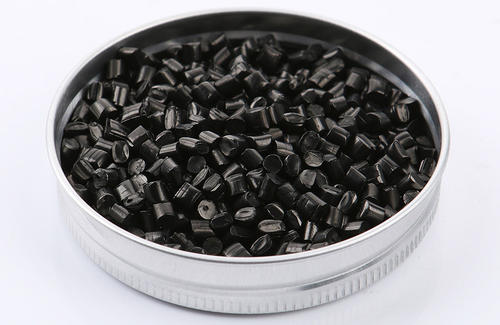Common knowledge of carbon black in black masterbatch
Carbon black, a type of amorphous carbon, is a light, loose, and fine black powder with a very large specific surface area ranging from 10-3000m2/g. It is the product of incomplete combustion or thermal decomposition of organic compounds (natural gas, heavy oil, fuel oil, etc.) in the presence of insufficient air. Specific gravity 1.8-2.1 refers to "gas black" made from natural gas, "lamp black" made from oil, and "acetylene black" made from acetylene. In addition, there are "slot black" and "furnace black". According to the functions of carbon black, there are "reinforced carbon black", "conductive carbon black", "wear-resistant carbon black", etc.
1、 Blackness and particle size
The blackness is directly related to the particle size of carbon black. The smaller the particle size, the larger the specific surface area, and the higher the blackness of carbon black. This is because although the primary particles have fused into the primary aggregate, their specific surface area can still function. The finer the primary particles, the larger the specific surface area of the condensate. The displayed color is darker and has better UV protection. Because the absorbance of fine particle carbon black is higher than that of coarse particle carbon black, the coloring power is stronger. But when the particle size decreases, because blue light is preferentially absorbed, the color tone becomes brown. Fine primary particles endow carbon black with a larger specific surface area and increase the difficulty of dispersion. Generally, surface treatment can adjust wettability and improve dispersion.
2、 Structure
Carbon black particles not only exist in the form of primary particles, but also melt and form condensates during production. This type of condensate is formed by chemical bonding of primary particles. During the condensation process, carbon black composed of a large number of primary condensates with branching chains is called high structure carbon black. Carbon black, which is composed of fewer primary particles with fewer chain branches, is called low structure carbon black. The structure of carbon black refers to the morphology of the carbon black extract. Generally, the more dense the chain branches, the higher the structure, and vice versa, the lower the structure.

3、 Surface Chemistry
The production methods of carbon black vary, and their surface chemical properties vary. The surface of carbon black has different oxygen-containing functional groups (such as carboxyl, lactone, phenolic, carbonyl, etc.). Carbon black with high oxygen-containing functional groups generally has high volatile content, good color tone adjustability, and high activity. After heating the carbon black sample to 825 ± 25oC, the volatile matter of carbon black is expressed as a percentage weight loss. The more oxygen-containing genes in carbon black, the greater the volatile content.
4、 Moisture absorption and density
Carbon black is a substance with a large surface area, therefore it has a certain degree of hygroscopicity. The moisture absorption of medium carbon black is mainly determined by the size of the surface area. Measures can be strengthened, especially in the packaging, storage, and transportation processes, to reduce the moisture absorption of the product. Due to the high moisture content, which can cause trouble in the processing, special packaging is required for certain types of carbon black.
Article source: Taishan conductive mica particles
-
04-11
Taishan conductive PP masterbatch: How to use defoaming masterbatch?
Defoaming masterbatch is suitable for enterprises that use PE and PP recycled plastics for product production. The trace amount of moisture contained in raw materials has a very serious impact on the
-
11-13
Characteristics and uses of conductive masterbatch plastics
Characteristics and uses of conductive masterbatch plastics1、 Characteristics of conductive masterbatch plastics:① Most plastics are lightweight, chemically stable, and will not rust;② Good impact res
-
10-13
What is PP talc powder masterbatch
What is the masterbatch of PP talc powder?PP talc powder masterbatch is a plastic modified filler, mainly composed of talc powder, which is a particle mixed with polymers or other carriers. It is main
-
08-09
Taishan Conductive Cloud Masterbatch Manufacturer Tells You Why to Use Conductive and Anti static Engineering Plastics
1. The fundamental physical properties of static electricity are:(1) Attracting or excluding;(2) There is a potential difference with the earth;(3) Discharge current will occur.These three characteris

